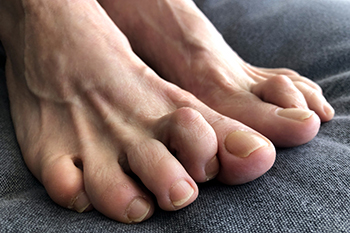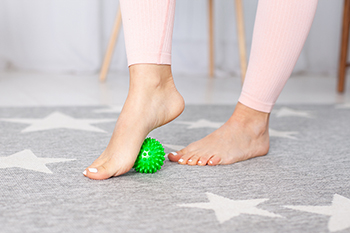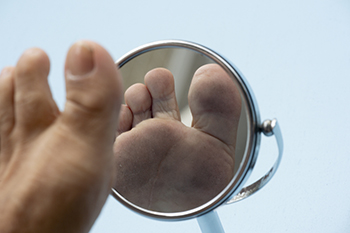Items filtered by date: April 2022
Do I Need Surgery for a Hammertoe?

A hammertoe affects one of the three middle toes of the foot, causing the toe to bend upward at its middle joint. Wearing shoes with larger foot beds, using shoe inserts or padding, toe stretching and strengthening exercises, and other lifestyle changes might be enough to manage a hammertoe. However, if those kinds of things do not help, surgery may be called for. Those with other foot problems like bunions, corns, or heel spurs may have surgery to take care of all problems at once. However, if one has poor blood circulation in their feet, any kind of foot infection, or health problems that make surgery a risky option, they are unlikely to be a good candidates. If you think you have a hammertoe and cannot find relief, consult a podiatrist for a customized treatment plan.
Hammertoe
Hammertoes can be a painful condition to live with. For more information, contact one of our podiatrists from ABC Podiatry. Our doctors will answer any of your foot- and ankle-related questions.
Hammertoe is a foot deformity that affects the joints of the second, third, fourth, or fifth toes of your feet. It is a painful foot condition in which these toes curl and arch up, which can often lead to pain when wearing footwear.
Symptoms
- Pain in the affected toes
- Development of corns or calluses due to friction
- Inflammation
- Redness
- Contracture of the toes
Causes
Genetics – People who are genetically predisposed to hammertoe are often more susceptible
Arthritis – Because arthritis affects the joints in your toes, further deformities stemming from arthritis can occur
Trauma – Direct trauma to the toes could potentially lead to hammertoe
Ill-fitting shoes – Undue pressure on the front of the toes from ill-fitting shoes can potentially lead to the development of hammertoe
Treatment
Orthotics – Custom made inserts can be used to help relieve pressure placed on the toes and therefore relieve some of the pain associated with it
Medications – Oral medications such as anti-inflammatories or NSAIDs could be used to treat the pain and inflammation hammertoes causes. Injections of corticosteroids are also sometimes used
Surgery – In more severe cases where the hammertoes have become more rigid, foot surgery is a potential option
If you have any questions please contact our office located in Columbus, OH . We offer the newest diagnostic and treatment technologies for all your foot and ankle needs.
The Danger of Chronic Skin Wounds
A chronic skin wound fails to heal within a normal time frame or does not heal at all, or has healed and reoccurred. Chronic skin wounds are often a complication of diabetes or certain types of vascular disease, but they may also occur from trauma, surgery, deep burns, infection, skin cancers, and more. A chronic skin wound is a potentially dangerous condition and must be treated by a professional. A podiatrist should be consulted if you develop a chronic skin wound on your feet, ankles, or lower leg. After reviewing your medical history and performing a thorough physical exam, your podiatrist may need to perform and/or analyze different types of lab tests to identify the type of wound and its underlying factors. Podiatrists treat wounds with a variety of methods and procedures depending on their cause and severity and your health. If you have developed a fever or increased pain, or your wound is bleeding or has pus or other discharge, see a podiatrist immediately.
Wound care is an important part in dealing with diabetes. If you have diabetes and a foot wound or would like more information about wound care for diabetics, consult with one of our podiatrists from ABC Podiatry. Our doctors will assess your condition and provide you with quality foot and ankle treatment.
What Is Wound Care?
Wound care is the practice of taking proper care of a wound. This can range from the smallest to the largest of wounds. While everyone can benefit from proper wound care, it is much more important for diabetics. Diabetics often suffer from poor blood circulation which causes wounds to heal much slower than they would in a non-diabetic.
What Is the Importance of Wound Care?
While it may not seem apparent with small ulcers on the foot, for diabetics, any size ulcer can become infected. Diabetics often also suffer from neuropathy, or nerve loss. This means they might not even feel when they have an ulcer on their foot. If the wound becomes severely infected, amputation may be necessary. Therefore, it is of the upmost importance to properly care for any and all foot wounds.
How to Care for Wounds
The best way to care for foot wounds is to prevent them. For diabetics, this means daily inspections of the feet for any signs of abnormalities or ulcers. It is also recommended to see a podiatrist several times a year for a foot inspection. If you do have an ulcer, run the wound under water to clear dirt from the wound; then apply antibiotic ointment to the wound and cover with a bandage. Bandages should be changed daily and keeping pressure off the wound is smart. It is advised to see a podiatrist, who can keep an eye on it.
If you have any questions, please feel free to contact our office located in Columbus, OH . We offer the newest diagnostic and treatment technologies for all your foot care needs.
We Can Treat Your Foot or Ankle Pain
A Tennis Ball and the Sole of the Feet
 There are many people who understand the benefits of exercising their feet. One way this can be accomplished is by using a tennis ball. This is done by rolling the bottom of the foot on the tennis ball, which may be beneficial in strengthening the overall foot. When this is practiced, it can help to release tension in the feet, and specific types of foot pain may gradually diminish. Research has indicated it may have a positive effect on the brain and nervous system. There are different points of the foot that correspond to specific internal organs. Improvement and good feelings may be noticed when these parts of the foot are massaged with a tennis ball. If you would like additional information about what size tennis ball to use that can help your feet, please ask a podiatrist.
There are many people who understand the benefits of exercising their feet. One way this can be accomplished is by using a tennis ball. This is done by rolling the bottom of the foot on the tennis ball, which may be beneficial in strengthening the overall foot. When this is practiced, it can help to release tension in the feet, and specific types of foot pain may gradually diminish. Research has indicated it may have a positive effect on the brain and nervous system. There are different points of the foot that correspond to specific internal organs. Improvement and good feelings may be noticed when these parts of the foot are massaged with a tennis ball. If you would like additional information about what size tennis ball to use that can help your feet, please ask a podiatrist.
Exercising your feet regularly with the proper foot wear is a great way to prevent injuries and build strength. If you have any concerns about your feet, contact one of our podiatrists from ABC Podiatry. Our doctors can provide the care you need to keep you pain-free and on your feet.
Exercise for Your Feet
Exercise for your feet can help you gain strength, mobility and flexibility in your feet. They say that strengthening your feet can be just as rewarding as strengthening another part of the body. Your feet are very important, and we often forget about them in our daily tasks. But it is because of our feet that are we able to get going and do what we need to. For those of us fortunate enough to not have any foot problems, it is an important gesture to take care of them to ensure good health in the long run.
Some foot health exercises can include ankle pumps, tip-toeing, toe rises, lifting off the floor doing reps and sets, and flexing the toes. It is best to speak with Our doctors to determine an appropriate regimen for your needs. Everyone’s needs and bodies are different, and the activities required to maintain strength in the feet vary from individual to individual.
Once you get into a routine of doing regular exercise, you may notice a difference in your feet and how strong they may become.
If you have any questions please feel free to contact our office located in Columbus, OH . We offer the newest diagnostic and treatment technologies for all your foot and ankle needs.
The Pesky Plantar Wart
 Viral infections caused by the human papillomavirus (HPV) that enter the skin of the feet can cause plantar warts. These are fleshy growths that typically form on the bottom of the feet. The pressure from walking can cause plantar warts to be painful. Plantar warts can grow individually, or they may cluster in what is known as a mosaic. They present as flat, circular, grainy patches of skin that can be small or large. A tiny black blood vessel, appearing as a dot, is often visible in the center of a plantar wart, which can often distinguish it from other types of growths. HPV is a highly contagious virus that can be spread from direct contact, or through exposure to the virus living on infected surfaces, such as communal showers, locker rooms, towels, shoes, socks, and more. Plantar warts are hearty and difficult to treat on your own. They are known to return if they are not properly treated. For these reasons, plantar warts often require professional care from a podiatrist. Make an appointment with a podiatrist if you or someone you love has developed one or more plantar warts.
Viral infections caused by the human papillomavirus (HPV) that enter the skin of the feet can cause plantar warts. These are fleshy growths that typically form on the bottom of the feet. The pressure from walking can cause plantar warts to be painful. Plantar warts can grow individually, or they may cluster in what is known as a mosaic. They present as flat, circular, grainy patches of skin that can be small or large. A tiny black blood vessel, appearing as a dot, is often visible in the center of a plantar wart, which can often distinguish it from other types of growths. HPV is a highly contagious virus that can be spread from direct contact, or through exposure to the virus living on infected surfaces, such as communal showers, locker rooms, towels, shoes, socks, and more. Plantar warts are hearty and difficult to treat on your own. They are known to return if they are not properly treated. For these reasons, plantar warts often require professional care from a podiatrist. Make an appointment with a podiatrist if you or someone you love has developed one or more plantar warts.
Plantar warts can be very uncomfortable. If you need your feet checked, contact one of our podiatrists from ABC Podiatry. Our doctors will assist you with all of your foot and ankle needs.
About Plantar Warts
Plantar warts are the result of HPV, or human papillomavirus, getting into open wounds on the feet. They are mostly found on the heels or balls of the feet.
While plantar warts are generally harmless, those experiencing excessive pain or those suffering from diabetes or a compromised immune system require immediate medical care. Plantar warts are easily diagnosed, usually through scraping off a bit of rough skin or by getting a biopsy.
Symptoms
- Lesions on the bottom of your feet, usually rough and grainy
- Hard or thick callused spots
- Wart seeds, which are small clotted blood vessels that look like little black spots
- Pain, discomfort, or tenderness of your feet when walking or standing
Treatment
- Freezing
- Electric tool removal
- Laser Treatment
- Topical Creams (prescription only)
- Over-the-counter medications
To help prevent developing plantar warts, avoid walking barefoot over abrasive surfaces that can cause cuts or wounds for HPV to get into. Avoiding direct contact with other warts, as well as not picking or rubbing existing warts, can help prevent the further spread of plantar warts. However, if you think you have developed plantar warts, speak to your podiatrist. He or she can diagnose the warts on your feet and recommend the appropriate treatment options.
If you have any questions please feel free to contact our office located in Columbus, OH . We offer the newest diagnostic and treatment technologies for all your foot and ankle needs.






